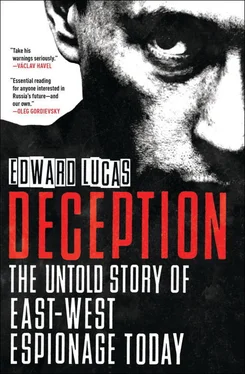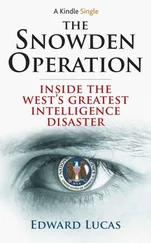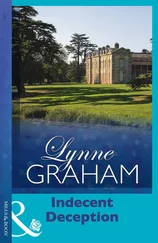unlawfully, wilfully and knowingly, did combine, conspire, confederate, and agree together and with each other to commit an offense against the United States.
It stated that the FBI’s investigation has revealed that
a network of illegals is now living and operating in the United States in the service of one primary, long-term goal: to become sufficiently Americanized, such that they can gather information about the United States for Russia, and can successfully recruit sources who are in, or are able to infiltrate, United States policy-making circles. 1
Richard and Cynthia Murphy lived in the New York suburb of Montclair. 2She had two undergraduate degrees from New York University and an MBA from Columbia Business School, and she worked in a financial services firm in New York. Her stocky, bearded husband had studied economics at the New School in New York, where his heavy accent and gloomy manner aroused only mild curiosity. Nina Khrushcheva, his Soviet-born supervisor, was puzzled by his claim to be of Irish extraction; to her well-tuned ear he sounded ‘instantly Russian’. 3But America is built on the idea that people can reinvent themselves, shedding identities from the old world and adopting new ones. Murphy was no different. Nothing else he did seemed to arouse any interest at all. As far as any outsider could see his main job was caring for the couple’s young daughters Katie and Lisa, aged eleven and seven in June 2010. That was when their parents – real names Vladimir and Lidiya Guryev – were arrested.
Murphy’s mission in America was unexciting, ferrying cash to other illegals. His wife had a more glamorous life at Morea Financial Services, a specialist tax firm dealing with the rich and famous. That was a perfect cover for her clandestine mission, to befriend wealthy Americans with political connections – including Alan Patricof, a close friend of Hillary Clinton. According to the criminal complaint issued by the Department of Justice, Mrs Murphy’s bosses in Moscow described Mr Patricof as:
a very interesting ‘target’. Try to build up little by little relations with him moving beyond just [work] [32] af Square brackets signify material redacted by the FBI before the complaint was made public.
framework. Maybe he can provide [MURPHY] with remarks re US foreign policy, ‘roumors’ [sic] about White House internal ‘kitchen’, invite her to venues (to [major political party HQ in NYC], for instance) etc. In short, consider carefully all options in regard to [financier]. 4
Two more of the illegals were equally unremarkable. Michael Zottoli and Patricia Mills (real names Mikhail Kutsik and Natalya Pereverzeva) studied and worked in Seattle before moving to Arlington, Virginia. Their task, as reported by the FBI, was also little more than to ferry sums of money around between other agents. The supposedly Uruguayan-born Juan Lazaro (Mikhail Vasenkov) was a ‘bag man’ too, bringing money from an unnamed South American country to America, apparently in collaboration with his wife, a radical Peruvian journalist called Vicky Peláez. His illegal mission had started in 1976. 5It clearly included some spying, as this bugged exchange from 2003, involving his wife’s trip to an unnamed South American country, indicates.
Lazaro: When you go… I am going to write in invisible [ink] and you’re going to pass them all of that in a book.
Peláez: Oh, OK.
Lazaro: I’m going to give you some blank pieces of paper and it will be there… about every thing I’ve done… 6
It is easy to mock the pointlessness of these people, apparently the least serious of the illegals, sent at vast trouble and expense to a foreign country in order to carry out tasks that most people manage with a mouse click. But it is not a laughing matter. 7
By far the most serious of the spies in terms of intellectual firepower and access to decision-makers in America and elsewhere was Andrei Bezrukov, who lived in Cambridge, Massachusetts under the alias of Donald Howard Heathfield, with his wife Yelena Vavilova (Tracey Lee Ann Foley). The elder of their two sons, Tim, was a student at Georgetown University in Washington, DC. Ms Foley was a real-estate broker. Her website carried convincing if fictional pabulum, describing her as:
a native of Montreal [who] lived and was educated in Switzerland, Canada and France. Prior to her career in real estate she worked as a Human Resources officer in Toronto and ran her own travel agency in Cambridge, Massachusetts that specialised in organising trips to French wine regions for small groups of enthusiasts. Ann’s cultural awareness and international experience make her sensitive to the needs of other people. She strives for excellence in everything she does. Ann succeeds through her ability to ensure quality service, honesty and integrity. You will appreciate Ann’s enthusiasm and commitment to make sure that your real estate goal becomes a reality.
Ann resides in Cambridge with her husband and two teenage sons. She and her family are fond of travel. They have enjoyed visiting much of Europe but are particularly in love with Asia. Ann also appreciates gourmet food, ballet and spending time with her children. 8
Her husband’s cover story was similar: bland and at least superficially convincing. Months after his deportation, his website www.futuremap.comwas still promoting his consultancy firm’s expertise:
Future Map Institute is [sic] global think-tank focusing on creating practical policy proposals (strategies) for dealing with most pressing problems. It collectively maps anticipated developments in a number of domains and tracks their evolution. The institute relies on the network of on-line collaborators and organises virtual conferences on critical issues. 9
Behind this waffle was a serious mission. Heathfield, in the view of American officials close to the case, was by far the most important of the spies they had under surveillance. His cover story gave him an entry into the highest levels of American business, academia and government, and a convincing reason for seeking the innermost thoughts of the people at the top of any organisation. For Heathfield’s career was only partly phoney. Although he used the stolen birth certificate of a Canadian baby who died in 1963, his qualifications were genuine. He had indeed studied international economics at York University in Toronto, 10earned a master’s degree in public administration from Harvard’s John F. Kennedy School and worked as a management consultant.
His striking quality was blandness: not one of the dozen or so associates I have quizzed can remember a distinctive quirk, foible or habit that made him stand out. He was bilingual in French and English (although with a faint accent in both). He joined professional bodies on his own merits, and networked assiduously with alumni, colleagues and other business associates. For Heathfield did not just pretend to be a management expert: he actually became one. He is probably the only spy in history to write an academic paper as part of his cover story. It appears as a chapter in Scenarios for Success , 11a collection of papers originally presented at a ‘Future Studies’ meeting in Oxford in 2005. One of the editors of the volume, Bill Sharpe, recalls a colleague ‘deeply involved in the subject’ and a friendly and collaborative editing process 12that mainly involved the ‘debranding’ of Heathfield’s work – in other words removing the frequent references to his trademarked ‘FutureMap’ decision-mapping software. Piquantly, Heathfield seems to have become rather fond of his assumed identity. ‘I know it was his cover but it bled through the surface and got into his soul,’ says a former associate. 13Since his return to Russia, he has tried to reknit the shreds of his reputation. His profile on LinkedIn, a business-networking site, has been updated with his new job, as an adviser to the chief executive of Rosneft, an oil company with close ties to the Kremlin. 14But it also gives a fragment of his real life: five years studying history at the Tomsk State University, from 1978 to 1983 (though what he did between graduating and appearing in Canada in 1992 remains a mystery). [33] ag I contacted Heathfield via LinkedIn, offering him a chance to review this chapter and give his comments. He replied by giving an email address, but never downloaded the file I sent him.
Читать дальше












